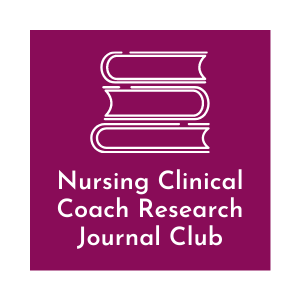
Description
Target Audience: The intended audience is nursing Clinical Coaches However, any nurse who is interested in the topic is welcome to attend.
Purpose: The Nursing Clinical Coach Research Journal Club strives to introduce nursing research that provides information related to the needs of a clinical coach.
Educational Objectives:
- To enhance nurses’ knowledge of the research process
- To enhance nurses’ ability to critically evaluate published nursing research
- To develop an awareness of current nursing research studies
- To evaluate current practice based on evidence-based nursing research results
- To further develop and enhance critical thinking skills
- To enable nurses in acute-care areas an opportunity to participate and network in a journal club that focuses on their specific needs
- To motivate nurses to participate in evidence-based practice and/or nursing research projects at Lee Health
Desired outcomes: The desired outcome is to improve nurses’ understanding of developing evidence-based practice and conduction of nursing research.
Format:
No registration necessary; all nurses are welcome to attend.
Participants can attend via web ex.
Participants should read the article prior to attending the sessions.
Frequency of meetings: Quarterly
Place: via Web-Ex.
Reading assignments: Copies of the reading assignments will be distributed by the club coordinator prior to the meeting.
Available credits: Lee Health is an approved provider of Continuing Nursing Education by the Florida Board of Nursing. This program has applied for 1 (one) contact hour.
Leader: Debbie Fleming, MSN, RN, NPD-BC
Previous Reading Assignments
2020
Mellore, P., Gregoric, C., & Gillham, C. (2017) Strategies new graduate nurses require to care and advocate for themselves: A literature review. Contemporary Nurse, 53(3), 390-405.
Wardrop, R., Coyne, E., & Needham, J. (2018). Exploring the expectations of preceptors in graduate nurse transition; a qualitative interpretative study. Nurse Education in Practice, 34(2019), 97-103.
Nielsen, A., Lasater, K. & Stock, M. (2016). A framework to support preceptors’ evaluation and development of new nurses clinical judgment. Nurse Education in Practice, 19(2016), 84-90.
2019
Tong, V. and Epenter, B. (2018). A comparative study of newly licensed registered nurses' stressors: 2003 and 2015. The Journal of Continuing Education in Nursing, 49(3), 132-140.
Figueroa, S., Gardner, J., Irizarry, J. & Cohn, T. (2016). Married state preceptorship model: Crossing the state line in new graduate nurse transition to practice. The Journal of Continuing Education in Nursing. 47(11), 511-517.
Ortiz, J. (2016). New graduate nurses' experiences about lack of professional confidence. Nurse Education in Practice, 19(2016), 19-24.
Strouse, S., Nickerson, C., & McCloskey, E. (2018). We don't miter the sheets on the bed: Understanding the preceptor role in the enculturation of nursing students. Nurse Education in Practice, 3292018), 21-27.
Tong, V. and Epenter, B. (2018). A comparative study of newly licensed registered nurses' stressors: 2003 and 2015. The Journal of Continuing Education in Nursing, 49(3), 132-140. Figueroa, S., Gardner, J., Irizarry, J. & Cohn, T. (2016). Married state preceptorship model: Crossing the state line in new graduate nurse transition to practice. The Journal of Continuing Education in Nursing, 47(11), 511-517.
2018
Ortiz, J. (2016). New graduate nurses' experiences about lack of professional confidence. Nurse Education in Practice, 19, 19-24.
Schuelke, S., and Barnason, S. (2017). Interventions used by nurse preceptors to develop critical thinking of new graduate nurses. Journal for Nurses in Professional Development, 31 (1), E1-E7.
Bontrager, S., Hart, P., & Mareno, N. (2016). The role of preceptorship and group cohesion on newly licensed registered nurses' satisfaction and intent to stay. The Journal of Continuing Education in Nursing, 47 (3), 132-139
McCrow, J., Yevchak, A., & Lewis, P. (2014). A prospective cohort study examining the preferred learning styles of acute care registered nurses. Nurse Education in Practice, 14, 170-175.
Goss, C. (2015). Systematic review building a preceptor support system. Journal for Nurses in Professional Development, 31 (1), E-7-E14.
2017
Robinson, J., Scollan-Koliopoulous, M., Kamienski, M., & Burke, K. (2012). Generational differences and learning style preferences in nurses from a large metropolitan medical center. Journal for Nurses in Staff Development, 28(4), 166-172.
Lachance, C. (2014). Nursing journal clubs: A literature review on the effective teaching strategy for continuing education and evidence-based practice. The Journal of Continuing Education in Nursing, 45(12), 559-565.
Tsai, Y., Lee-Hsieh, J., Turton, M., Li, S., Tseng, H., Lin, H., & Lin, H. ( 2014). Nurse-Preceptor training needs assessment: Views of preceptors and new graduate nurses. The Journal of Continuing Education in Nursing, 45(11), 497-505.
Haggerty, C.; Holloway, K. & Wilson, D. (2012). Entry to nursing practice preceptor education and support: Could we do it better? Nursing Praxis in New Zealand, 28(1), 30-39.
2016
Raines, D. A. (2012). Nurse preceptor’s views of precepting undergraduate nursing students. Nursing Education Perspectives, 33(2), 76-80.
Kenneth, J. O. (2011). Using problem-based learning in the clinical setting to improve nursing student’s critical thinking: An evidence review. Journal of Nursing Education, 50(3), 145-151.
Hill, Y., Salmu, M. & Jonson, E. (2014). Perspectives on good preceptorship: A matter of ethics. Nursing Ethics, 21(5), 565-575. Doi: 10.1177/0969733013511361
Giallonardo, L. M. , Wong, C. A., & Iwasiw, C. L. (2010). Authentic leadership of preceptors: Predictor of new graduate nurses’ work engagement and job satisfaction. Journal of Nursing Management, 18, 993-1003. Doi: 10.1111/j.1365-2834.2010.01126.x
2015
Foley, V., Myrick, F., & Yonge, R. (2012). Generational clashpoints in nursing Preceptorship. Journal of Nursing Education, 51 (10), 556-562. doi: 10.3928/01484834-20120820-04
Figueroa, S., Bulos, M., Forges, E. & Judkins-Cohn, T. (2013). Stabilizing and retaining a quality nursing work force through the use of the married state preceptorship model. The Journal of Continuing Education in Nursing, 44 (8), 365-373. doi: 10.3928/00220124-20130603-08
Kaddoura, M., A. (2013). The effect of preceptor behavior on the critical thinking skills of new graduate nurses in the intensive care unit. The Journal of Continuing Education in Nursing, 44 (11), 488-495. doi: 10.3928/00220124-20130816-21
Matua, G. A., Seshan, V., Savithi, R., & Fronda, D., C. (2014). Challenges and strategies for building and maintaining effective preceptor-preceptee relationships among nurses. Sultan Qaboos University Medical Journal, 14 (4), 530-535.